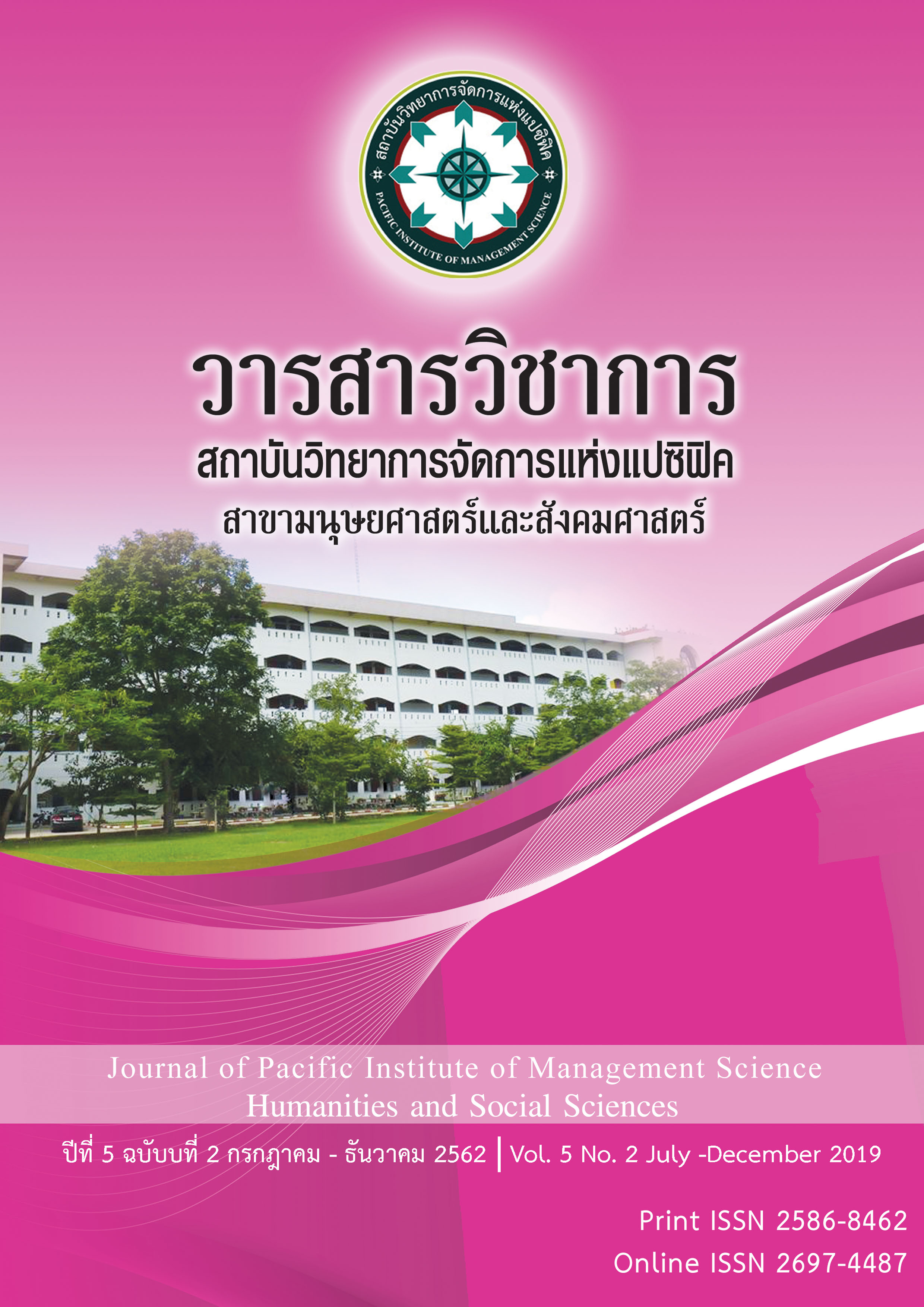The learning organization management for modern retail Business in Nonthaburi
Keywords:
Organization, Learning, Retail Business, Nonthaburi.Abstract
The purpose of this research was to study 1) to studies the elements of organizing the learning organization of modern retail businesses, 2) to studies the learning organization of modern retail businesses, 3) to studies the effectiveness of organizing organizations Learning of modern retail businesses 4) to studies the relationship between organizing learning organizations of modern retail businesses and Being a learning organization of modern retail business 5) to studies the relationship between being a learning organization of modern retail business. And the effectiveness of organizing the learning organization of modern retail businesses 6) to studies the relationship as a learning organization of modern retail businesses and the effectiveness of organizing the learning organization of modern retail businesses By using the conceptual framework and theory of knowledge management Tools used to store data include Quantitative research is employees working in department stores. Only 400 people in Nonthaburi province analyzed data using computer software. Summary of research results.
The research Objective 1: To studies the elements of the organization of learning organization of modern retail business as a whole with a high level of opinion. When considering each aspect, it was found that the leadership aspect had a high level of opinion.
The research Objective 2: To studies the learning organization of modern retail business as a whole with a high level of opinion. When considering each aspect, it was found that the level of power was very high.
The research Objective 3: To studies the effectiveness of the learning organization of modern retail businesses. In general, there are many opinions. When considering each aspect, it was found that the satisfaction level had a high level of opinion.
The research Objective 4: To studies the relationship between the organization of the learning organization of the retail business as a whole. With statistical significance at 0.01
The research Objective 5: To studies the relationship between being a learning organization of modern retail business. And the effectiveness of organizing the learning organization of the modern retail business as a whole. With statistical significance at 0.01
The research Objective 6: To studies the relationship of being a learning organization of modern retail business and the effectiveness of organizing learning organization of modern retail business in the whole. With statistical significance at 0.01
References
บูรชัย ศิริมหาสาคร. (2550). การจัดการความรู้สู่ความเป็นเลิศ. กรุงเทพมหานคร: แสงดาว.
สุภมาส อังศุโชติ และคณะ. (2551). สถิติวิเคราะห์สำหรับการวิจัยทางสังคมศาสตร์และพฤติกรรมศาสตร์: เทคนิคการใช้โปรแกรม LISREl. เจริญดีมั่งคงการพิมพ์. กรุงเทพมหานคร.
อดิศร ไชยคุปต์. (2554). ได้กำหนดยุทธศาสตร์ไว้หลายด้านและในยุทธศาสตร์ด้านที่ 4. เข้าถึง www.oja.go.th/humun/education/data/gynabadnubk.doc. เดือนเมษายน.
Beesley, L.G.A., & Cooper, C. (2008). Defining knowledge management (KM) activities: Towards consensus. Journal of Knowledge Management.
Cronbach, Lee Joseph. (1970). Essentials of Psychological Testing. New York: Harper and Row.
Chennamaneni, A. (2006). Determinants of knowledge sharing behaviors: Developing and testing an integrated theoretical model. (Doctoral dissertation). Arlington: The University of Texas.
Chaplin, J.P. (1968). Dictionary of Psychology. New York: Peaguin book.
Dalkir, K. (2005). Knowledge management in theory and practice.USA: Elsevier Butterworth Heinemann.
Hsy, I.C., and Want, Y.S. (2008). A model of intraorganizationl knowledge sharing: Development and initiak test.
Journal of Globak Information Management.
Hoy W.K. and Miskek, C.G. (2008). Educational Administration: Theory, Research and Practice. New York: McGraw-Hill, Inc.
Hendriks, P. (1999). Why share knoeledge? The influence of ICT on the motivation for knowledge sharing.
Knowledge and Process Management.
Ichijo, K., and Nonaka, I. (2007). Knowledge creation and management: New challenges for managers. New
York:Oxferd university Press.
Jasimuddin, S.M. (2008). A holistic view of knowledge management strategy.Journal of Knowledge management.
Keyes, J. (2008). Identifying the barriers to knowledge sharing in knowledge intensive organizations (Doctoral dissertation). Prescott Valley, Arizona: North central University.
Lovelock C. and Wrigth L. (2007). Principles of service marketing and management. 2 th ed. Upper Saddle River,
NJ: Prentice Hall.
Lawrence, D.J. (1998). Organizational Behavior. 2nd ed. New Jersey: Prentice-Hall, Inc.
Leiponen, A. (2006). Dynamic competences and firm performance (Interim report) Laxenburg, Austria, Intemational Institute for Applied Systems Analysis (IIASA): 1-22.
Lai, M.F. and Lee, G.G. (2007). Risk avoiding cultures toward achievement of knowledge sharing. Business
Process Management jourmal.
Lunenburg, Fred C. and Ornstein, Allan C. (2004). Educational Administration: Concepts and Practices. 4th ed.
Belmont, CA. Thomson Wadsworth.
Mill, John. Stuart. (2001). On liberty. Kitchener: Batoche Books. Availabie: socserv2.socsci.
mcmaster.ca%7Eecon/ugcm/3113/mill/liberty.pdf.
Marquardt, M. J. (2002). Building the learning organization: Mastering the 5 elements for corporate learning. 2th
ed. New York : Palo Alto. Ca: Davies-Black Publishing.
Meron o-Cerdan, A.L., Lopez-Nicolas, C., and Sabater-Sa nchez, R. (2007). Knowledge management strategy diagnosin fron KM instrumens use. Journal of knoeledge Management.
Popper, M. and Lipshitz, R. (2000). Organizational Learning: Mechanisms, culture and
Feasibility. Management Learning. Vol.31 (No.2): pp.191-196.
Rhodes, J., Hung, R., Lok, P., Lien, B.Y.H., and Wu, C.M. (2008). Factors influencing organizational knowledge transfer: implication for corporate performance. Journal of Knowledge Management.
Revans, R. W. (1998). ABC of action learning. London: Lemos & Crane.
Robbins, Stephen P. (1994). Essentials of Organizational Behavior. 4th ed. New Jersey: Prentice – Hall
Senge, Peter M. (1990). The Fifth Discipline: The Art and Practice of the Learning
Organization (Rcv.ed.). New York: Doubleday.
Schwarzwalder, Robert. (1999). Librarians as knowledge management. 22, 4 (Aug-Sep)
Teece, D.J.(2007). Explicating dynamic capabilities:The nature and microfoundations of (suatainable) enterprise
performance. Strategic Management Journal, 28(13) 1319-1350.
Ubben, C.G., Hughes, L.w. and Norris, C.J. (2001). The Principle: Creative Leadership for Effect Schools. 4th ed.
Boston: Allyn & Bacon.
Downloads
Published
Issue
Section
License
บทความที่ได้รับการตีพิมพ์เป็นลิขสิทธิ์ของ สถาบันวิทยาการจัดการแห่งแปซิฟิค
ข้อความที่ปรากฏในบทความแต่ละเรื่องในวารสารวิชาการเล่มนี้เป็นความคิดเห็นส่วนตัวของผู้เขียนแต่ละท่านไม่เกี่ยวข้องกับสถาบันวิทยาการจัดการแห่งแปซิฟิค และคณาจารย์ท่านอื่นๆในสถาบันฯ แต่อย่างใด ความรับผิดชอบองค์ประกอบทั้งหมดของบทความแต่ละเรื่องเป็นของผู้เขียนแต่ละท่าน หากมีความผิดพลาดใดๆ ผู้เขียนแต่ละท่านจะรับผิดชอบบทความของตนเองแต่ผู้เดียว







